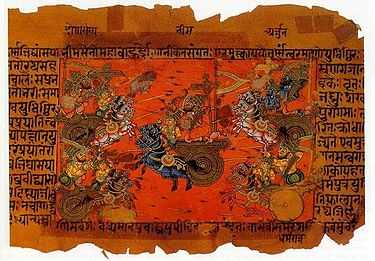Dushasana

Duhshasana (Sanskrit: दुःशासन, Duḥśāsana), also spelled as Dushasana and Dushyasana, was a Kaurava prince, the second son of the blind king Dhritarashtra and Gandhari and the younger brother of Duryodhana in the Hindu epic Mahabharata.
Birth and development
When Dhritarashtra's queen Gandhari's pregnancy continued for an unusually long time, she beat her womb in frustration and in envy of Kunti, the queen of Pandu, who had given birth to two of the five Pandavas. Due to her actions, a hardened mass of grey-colored flesh emerges from her womb. Gandhari is devastated, and calls upon Vyasa, the great sage who had blessed her with one hundred sons, to redeem his words. Vyasa divides the flesh ball into a hundred equal pieces, and puts them into pots of ghee, which are then sealed and buried in the earth for one year. At the end of the year, the first pot is opened, and Duryodhana emerges. The next one to emerge is Dushasana.
Dushasana is devoted to his older brother Duryodhana. He is also closely involved in the various schemes and plots to kill the Pandavas.
Draupadi's humiliation

After Yudhisthira loses his kingdom, his brothers and his wife Draupadi, in a game of dice with Shakuni, Dushasana dragged Draupadi by the hair into the assembly, at the behest of his brother Duryodhana, and tried to disrobe her. Draupadi prayed to Krishna and he made her sari to be of infinite length, so that Dushasana could not take it off. However, the princess was humiliated by being dragged into court by her hair. Because of this humiliation, Draupadi vowed that she would not tie her hair until she had washed it with the blood from Dushasana's chest.
Death

In the Kurukshetra War, Bhima kills Dushasana, tears open his chest, and drinks his blood, as pledged. After dancing around Dushasana's corpose, he brings Dushasana's blood to Draupadi, thus helping Draupadi redeem her vow while redeeming his own. Dushasana's death greatly agitated Karna and Duryodhana, and demoralized the Kaurava army watching Bhima in his ecstasy of wrath.
The name

The name is often derived from two elements, the Sanskrit: duh, meaning "hard, tough," and shasana, meaning "ruler, punisher."
References
- The Mahabharata (1999) by Krishna Dharma
External links
-
 Media related to Dushasana at Wikimedia Commons
Media related to Dushasana at Wikimedia Commons
| |||||||||||||||||||||||||
| |||||||||||||||||||||

